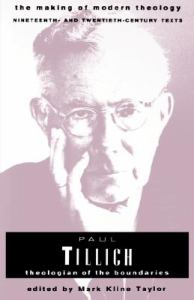
“Taylor’s well-constructed anthology, through its erudite selection of texts, provides solid introduction to the essential Paul Tillich.” John R. Connally, Religious Studies Review
“ Taylor’s introduction to his Tillich reader is the only one of the introductions that attempts to be a creative interpretation of the thinker under scrutiny. ” Dawn De Vries, Theology Today
“Hell rages around us. It’s unimaginable.” So wrote the 28-year-old theologian and German Army chaplain to his father from the trenches of World War I, where Paul Tillich served as grave digger and pastor. The war returned the young German patriot and chaplain to Berlin, where during the Weimar Republic between World Wars he became known in thought and politics as “the radical theologian,” and in life-style a bohemian, independent mind and spirit. His formulation of a theology of culture and a “religious socialism” came to fruition in a 1933 work, The Socialist Decision, which was immediately banned by the Nazis, confiscated, thus consigned for years to being known only to those who passed it hand-to-hand in Germany, clandestinely. He was on the first list of intellectuals purged, the first Christian to appear among purged Jewish scholars.
Later in the the U.S., to which he had fled, his radical politics became more complex, more blended with a personal existentialism, but his counter-imperial politics persisted, radically enough to cause U.S. officials to end his Voice of America broadcasts to Germans because he wasn’t “anti-German” enough. Although he softened his socialism in the U.S., he courageously interrogated U.S. intentions at the very heighth of its war-time mobilization. As just one example of such questions, Tillich asked a gathering at a church in Indiana:
“When we fight against Japan, do we fight a racial war, a war for the maintenance of European imperialism in Asia, or do we fight for the freedom of Asia also from ourselves?” 50th Congress of the Protestant Episcopal Church, Indianapolis, May 6, 1942.
The spirit of questioning was one he never relinquished, whether he was formulating his three-volume Systematic Theology or crafting his numerous other writings during professorships at Union Theological Seminary/Columbia University, Harvard, and the University of Chicago – the latter being the site of his death in 1965.